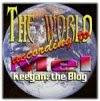[page back]
The ground still trembled beneath Faunos’s bare feet, but the violent shaking had stopped. The earth was not at peace, it was wounded, like a stag that had been hunted to the brink of death and left to expire of exhaustion. The sky was dark as night, though he knew the sun was still up. Helios had turned away from those who prayed for mercy, hidden his face and abandoned the world to Hurucan and Peseden, and perhaps to the Titans who lived deep in the earth. Their fury shook the very foundations of Zeheft, and the old city lost the battle.
Lightning forked from horizon to horizon, chasing the thunder with a second to spare. The storm was directly overhead, and the rain pummeled his back and shoulders. Faunos stood in the open between the tumbled wreckage of the temple of Nut and the edge of the cliff. When the sun rose that morning, the temple had stood on the landward edge of the marketplace, and now there was no marketplace, no rank of fisherfolk’s cottages, no quay.
The sea smashed against the cliff face, as if Peseden were trying to batter his way into the heart of the island. To the west, Kush and Nefti lay so deep beneath the waves, their towers did not even break the surface now. Another storm like this one, another beating by the gods and Titans, and Zeheft would follow.
Like pearls on a broken strand, the outer islands were vanishing. When Faunos was a boy it had seemed they had lived forever and would live on into a future that was without end. In those days, he had thought the whole world was water. From his room above the net maker’s workshop, he could see the whole way to the end of the quay, and he would watch the fishing boats make their way out with the rising tide. On hot nights he climbed out of the window and sat on the roof in the breeze, watching the lanterns bob, out in the blue darkness.
It was all gone now. Zeheft was ruins and the fishing fleet had vanished over the horizon, thirty fragile boats fleeing the fury of the storm. Every vessel was dangerously overloaded. The people of Zeheft placed the tattered remnants of their faith in the gods, and fled before the thunder began to shout over the dragon’s spine ridge of the mountains.
Rain curtained the ocean, and Faunos turned his back on it. He was cold, naked save for a scrap of linen about his hips that was sodden, and the first priority on his mind was shelter. No place in Zeheft had been safe when the ground shook, but the tremors he still felt through tee soles of his feet were mild now, and Galen believed it should be safe. The buildings which were going to fall had already come down; those which had endured this long would stand.
Until the next storm, or the next time the earth heaved like the ocean, Faunos thought bleakly. And then nothing would be left of Zeheft save rubble and tears. The rain was so heavy, it almost seemed that his back was being beaten, and so cold, his limbs had begun to shudder. The narrow little streets that had led up the hillside above the marketplace were a maze of fallen walls and roofs, and waterfalls had begun to gush from every crevice.
Swearing by any god he could recall, he turned away from them too, and cast out along the cliff. If the city was ruined and would soon be flooded, could the contagion be far behind? Mariners had tied up in the harbor of Zeheft just days before, with stories of the sickness in Ilios. It was said that even the warships would not berth there, and that the wells were tainted. All eyes turned, now, to Vayal, as if the people fleeing the islands expected the great priest-king himself to speak some mighty word, bend Helios to his will, and fetch back the great days of old.
Such hopes were just dreams, Faunos thought, and yet people must cling to dreams when they had no other solace. For himself, he would have fled Zeheft with the others, if there had been space on the boats; but every place was saved for the young, the physicians, teachers, priests, those who would preserve the heart and soul of Zeheft, though the homeland itself was gone.
The cold struck to his marrow, and he began to run, in a vain effort to kindle warmth. He struck out east, away from the shattered bones of the city, and in the dazzling flashes of lightning he picked out the shapes of buildings which still huddled like forlorn sheep or goats to the crags facing the sea.
The animals had fled hours ago. Long before the earth began to shake, not a sheep was to be seen, nor a bird in the trees. The shepherds had recognized the omen and fled with them, and they must be in the high hills, finding shelter where they could.
As Faunos came around the broken headland, he saw the shallow valley where the old city had been -- the poor people’s houses, clustered around the ancient wells and strung out along the beach. It was all gone. Here and there a rooftop showed above the crashing waves, but under the onslaught of the ocean, nothing would survive for long.
Go to Part Two of The Sport of Gods and Titans...











